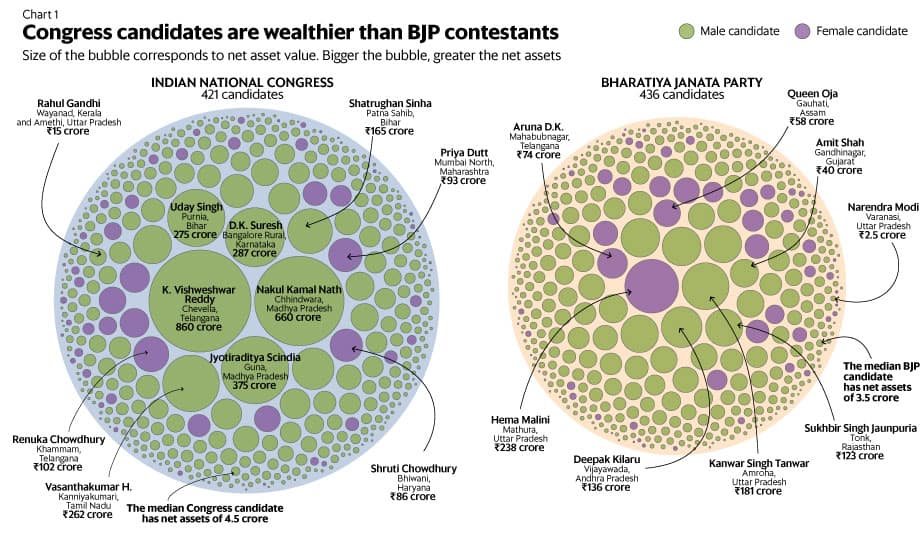Nexus of money, crime continues in 2019 polls
The candidates contesting the 2019 Lok Sabha elections are richer and facing more criminal charges than the contestants of previous elections
 Premium
PremiumWith the seventh phase of polling complete, candidates now await results and, for many, it will be a nervous wait. As Indian elections get bigger, the competition is getting fiercer. This year’s elections have seen 8,048 candidates from 679 parties contest; 15 years ago, it was 3,262 candidates representing 157 parties. And as the candidate cohort increases, some candidate features are growing in significance. Across India, both aspiring and serving politicians are getting wealthier and facing more criminal cases—a trend with important ramifications for politics, economics and society.
In these elections, the median wealth of candidates (measured by net assets declared by the candidate) is ₹25 lakh, according to data provided by the Association for Democratic Reforms, and treated by Trivedi Centre for Political Data of Ashoka University. For perspective, the average Indian’s net worth in 2012 was around ₹85,000, according to one study.
The median wealth is actually dragged down by the plethora of independent candidates (3,441) and smaller party candidates who tend to be less wealthy than larger national party members. For instance, the median wealth for the Bharatiya Janata Party’s (BJP’s) 436 candidates is ₹3.5 crore and for the Congress’ 421 candidates the median wealth is even higher at ₹4.4 crore. In reality, these numbers are likely underestimates since this is merely self-declared data from election affidavits and not a comprehensive measure of wealth.

The richest candidate, though, is actually an independent. Ramesh Kumar Sharma, contesting from Pataliputra, Bihar, who has declared ₹1,100 crore which is the value of the agricultural land he owns in Navi Mumbai.

At the constituency-level, the wealthiest candidates seem to be contesting from the North-East and parts of Uttar Pradesh. Southern constituencies, barring a few in Andhra Pradesh and Telangana, seem to have less wealthy candidates contesting. Since 2004, the median wealth across candidates has nearly trebled. More pertinently, candidates who repeatedly contest and win elections are significantly richer. For instance, the richest candidates are the recontesting members of Parliament (MPs) who had won in the previous elections.
The median wealth of renominated MPs is ₹4.37 crore—and this has significantly increased over the last five years (their median wealth was ₹3.34 crore when they were elected in 2014).
This data simply confirms the increasingly strong relationship between money and electoral success. Political scientists Devesh Kapur and Milan Vaishnav show that of the 21,000 candidates who contested the last three general elections, the wealthiest 20% were over 20 times more likely to win elections than the poorest 20% .
Wealth has become central to Indian politics partly because candidates have to finance their own campaigns. And as competition gets tougher and constituencies get more crowded, more money is needed. According to political scientist Neelanjan Sircar, this is hurting Indian democracy. He argues that wealthier candidates are less representative of their constituents and share less of their concerns. More worryingly, if candidates view campaigns as investments, this could lead to increased cases of corruption once they’re in power, as they look to recoup their investment.
Given the lack of data from constituencies, measuring the effect of wealth on overall political performance is difficult, but Parliament data does allow comparisons between MP wealth and Parliament participation. Matching MP Parliament performance scores, calculated in an earlier Plain Facts column, with wealth levels does not reveal any major pattern. Richer and poorer MPs do not seem to visibly differ in Parliament participation.
As money has grown in prominence, so has crime. In these elections, around 14% of all candidates have serious pending criminal cases filed against them (in 2004, the figure was 8%). Among parties fielding at least 20 candidates, the Rashtriya Janata Dal has the highest proportion of candidates facing serious criminal charges (57% of candidates). The national parties field fewer such candidates, but the figure is 28.44% for the BJP and 25.41% for the Congress. A significant portion of these criminally accused candidates is contesting from Uttar Pradesh and Bihar. In Pratapgarh, Uttar Pradesh, for instance, five of the seven candidates are facing criminal charges.

Crime, too, seems to be strongly linked with electoral success. In the last elections, almost one in five winners had serious criminal cases pending against them, and this ratio has steadily increased over the last three elections. In his book, When Crime Pays: Money and Muscle in Indian Politics, Vaishnav argues that parties choose criminal candidates because they tend to be wealthier and voters vote for criminals because they believe they can get things done for them. Criminals themselves tend to enter politics for both the potential protection and the potential financial benefits it offers. Data from these elections hints at this. Of the recontesting MPs who have seen their wealth grow over the last five years, most are facing criminal charges of some sort.
Beyond the democratic concerns of criminal involvement in politics, on the ground, criminally accused politicians can hurt local development. In a 2017 study, Nishith Prakash and others show that electing a candidate accused of a serious crime causes a significant reduction in a constituency’s economic growth and this effect is more pronounced in poorer states such as Bihar and Uttar Pradesh.
Political scientists argue that tackling these issues will require a multipronged approach involving both electoral finance reforms and ramping up state capacity. Until then, the nexus of crime and money in Indian politics is likely to flourish.
Unlock a world of Benefits! From insightful newsletters to real-time stock tracking, breaking news and a personalized newsfeed – it's all here, just a click away! Login Now!


